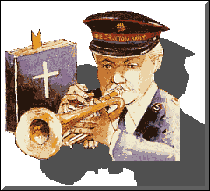|
|
|
Conservative Christians were upset by the public spectacle; the Army, however, happily banged cymbals, beat drums, and sang--their goal was to attract attention. Using contemporary advertising techniques, pageants, and parades, the Salvation Army made a vibrant mark on the urban scene and the American consciousness. Over time the Army's focus shifted from proselytizing to practical religion: gaining converts through religiously motivated social programs. Soup kitchens, homeless shelters, coal in winter--the Army offered relief to all, regardless of race, religion, or creed. Its greatest success, however, came when it sent 250 workers, including a few dozen women, to Europe to provide a little bit of home to the boys fighting in the Great War. With their trays of doughnuts and pitchers of coffee, the "Sallies" boosted morale and earned the Salvation Army a tremendous amount of respect. Winston's book reveals that she, too, respects both the Army's mission and its theology, and she tells its story with graceful prose. Red-Hot and Righteous will interest scholars of religious movements and 19th-century urban life alike. --C.B. Delaney
